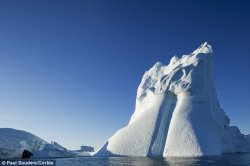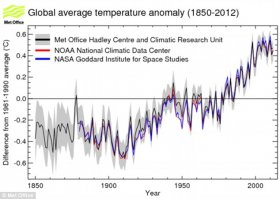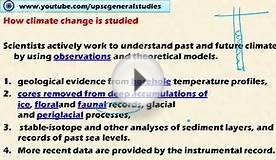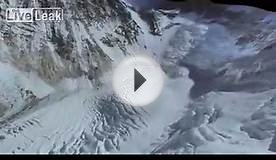Climate change and global warming articles
 A new scientific paper has warned that melting of ice sheets in West Antarctica and Greenland may be happening 10 times faster than was previously predicted. This could lead to sea levels rise of up to 30 feet within 50 years, they warn. A picture of an iceberg which calved off from the Greenland ice sheet is pictured
A new scientific paper has warned that melting of ice sheets in West Antarctica and Greenland may be happening 10 times faster than was previously predicted. This could lead to sea levels rise of up to 30 feet within 50 years, they warn. A picture of an iceberg which calved off from the Greenland ice sheet is pictured
They conclude that 2°C of warming – the international target for limiting global warming – will be 'highly dangerous' to humanity.
The study warns that glaciers in Greenland and the Antarctic could melt 10 times faster than projections put forward by the UN's Intergovernmental Panel on Climate Change, which predicted sea levels would rise by around one metre (three feet) by the end of the century.
RISING SEAS COULD DESTROY TURTLE POPULATIONS
Rising sea levels could destroy many of the nesting sites used by endangered sea turtles around the world, a new study has warned.
Researchers have found that as coastal nesting sites become flooded with sea water more often, many turtle populations will struggle to produce sufficient young.
 They found that green turtles on Raine Island on the Great Barrier Reef, are now regularly being swamped with sea water.
They found that green turtles on Raine Island on the Great Barrier Reef, are now regularly being swamped with sea water.
This is leading to just 10 per cent of the eggs hatching into turtles, while in other parts of the world usually around 90 per cent of eggs hatch.
The researchers found that eggs submerged in sea water for up to six hours had a far reduced chance of hatching as the embryos struggled to get enough oxygen to survive.
The scientists said: 'Social disruption and economic consequences of such large sea level rise could be devastating.
'It is not difficult to imagine that conflicts arising from forced migrations and economic collapse might make the planet ungovernable, threatening the fabric of civilization.'
Dr Hansen, who was Nasa's lead climate scientist until 2013 when he retired and now holds a post with Columbia University's Earth Institute, has described the paper as his most important to date.
Dr Hansen was one of the first scientists to publicly highlight the risk of global warming during evidence he gave to the US congress in 1988.


|
Fallacy of the Green Movement and Climate Change: Personal Collection of Papers and Responses Disputing Positions of the EPA-Environmental Protection ... by Al Gore, and Responses to Media Articles Book (Xlibris) |